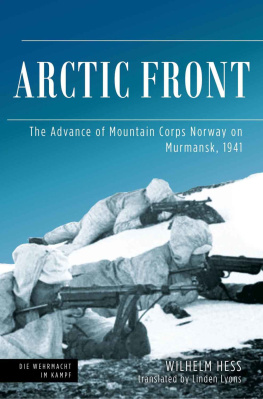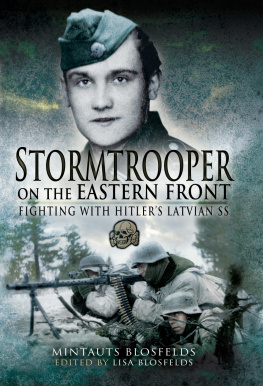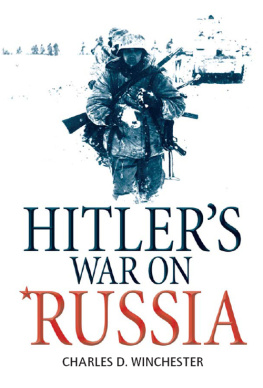

To Tommy
Published in the United States of America and Great Britain in 2017 by
CASEMATE PUBLISHERS
1950 Lawrence Road, Havertown, PA 19083, USA
and
The Old Music Hall, 106108 Cowley Road, Oxford OX4 1JE, UK
Copyright 2014 Alf R. Jacobsen
Original Norwegian language edition titled Miraklet ved Litza , first published by Vega Forlag in 2014.
All efforts have been made to find rights holders for all the photographs and illustrations in this book. If there are errors or omissions in the list of illustrations, please contact the publisher.
Translation by Frank Stewart
Hardcover Edition: ISBN 978-1-61200-5065
Digital Edition: ISBN 978-1-61200-5072
A CIP record for this book is available from the Library of Congress and the British Library
All rights reserved. No part of this book may be reproduced or transmitted in any form or by any means, electronic or mechanical including photocopying, recording or by any information storage and retrieval system, without permission from the publisher in writing.
Printed and bound in the United States of America
Typeset in India by Lapiz Digital Services, Chennai
For a complete list of Casemate titles, please contact:
CASEMATE PUBLISHERS (US)
Telephone (610) 853-9131
Fax (610) 853-9146
Email:
www.casematepublishers.com
CASEMATE PUBLISHERS (UK)
Telephone (01865) 241249
Fax (01865) 794449
Email:
www.casematepublishers.co.uk
Contents
Preface
Despite the significant effect Operation Barbarossa had on the Arctic war, we have until now lacked an in-depth work about what happened on the northern sector of the Eastern Front in the summer of 1941 and its relevance to the negotiations about aid to the Soviet Union.
From a military point of view, the closest we have come to a comprehensive account has been The German Northern Theatre of Operations 19401945, by the American military historian Earl F. Ziemke. However, Ziemkes book was written before 1959 and based on a rather pedantic study of German documents without use of diaries, eyewitness accounts or interviews with the leading officers who were still alive at that time. Soviet sources were excluded, and Norwegian sources were not used. As a result, Ziemke missed out on the conflicts of interest and the important strategic perspectives which resulted from Stalins requests for a second front in the north and an occupation of Spitsbergen and Bear Island. His work must to a large extent be considered outdated.
Miracle at the Litza is an attempt on my part to fill this gap. My narrative is based on many years of work in archives in Norway, Great Britain, Germany and Russia, and I am particularly grateful for the support I have had from Axel Wittenberg who combed through the German military archives in Freiburg, and Miroslav Morozov who discovered important information in the Russian military archives in Moscow.
We dont yet have answers to all the questions. Nevertheless, I hope that this study will take us a few steps forward in understanding what happened in the northern regions during that dramatic and bloody summer of 1941. I am particularly glad that the opening of the Enigma archives for the first time has made it possible to give an accurate description of the codebreakers contribution to the Royal Navys enormously effective offensive against the German convoy traffic along the coast of Finnmark during the decisive weeks in August and September 1941.
Alf R. Jacobsen
2 July 2017
PROLOGUE
August 1940
The Northern Front
Trondheim, Thursday 15 August 1940
Rain was still falling when Colonel General Nicolaus von Falkenhorsts motorcade drew up in front of the monumental faade of the Britannia Hotel. The cathedral bells had just struck nine, and a hundred homeless engineering students were gathering outside the student accommodation agency after a cold night on the park benches. The persistent rain was ruining the strawberry harvest, and in the surrounding countryside many of the cornfields had been flattened by a storm a few days earlier. Out in the fjord, however, the fishing boats were already on the way to rland, where the herring bonanza of the century had just taken place. The new freezer in the cold-store at Ravnkloa fish-market had been made ready just in time.
Now all that fine oily herring that used to go to waste can be frozen and preserved by our new rapid freezing system, explained manager Bjarne wre, who had invited the towns leading citizens to the opening ceremony on Saturday, we should never lack fish either in the North or anywhere else.
The white-painted industrial building with the Birdseye revolutionary patent plate freezers was financed by German capital and represented a vital stage in the process of incorporating occupied Norway in the new European greater economic area (Grosswirtschaftsraum) as main supplier of fish to the Wehrmacht and other major customers on the continent.childs toy. Albert Speer, Hitlers favourite architect, had already ordered several thousand tonnes of marble, granite and reinforcing iron for a series of monumental new buildings. A suburb with room for 250,000 Aryan immigrants was being planned and a four-lane motorway would link the old cathedral town to the metropolises of the Thousand Year Reich. German artists would give the fantasies of world domination an aesthetic gloss, and at the weekend the gorgeous ballerina Bianca Rogge from Berlin had spellbound soldiers and civilians to the strains of music from concert pianist Emil Debusemann.
Falkenhorst, a stockily built man, hardly had time to think about the many aspects of the occupation before he was met at the main entrance by General Eduard Dietl, who had established the headquarters of the Mountain Corps Norway in the luxurious Britannia Hotel after the victory at Narvik two months earlier. We have no reason to assume that the meeting between the two German commanders was warm and friendly. In the summer of 1940, Falkenhorst was at the apex of the power pyramid of the northern theatre of military operations. In April he had been awarded the Knights Cross of the Iron Cross, in May he had adorned the front page of Time Magazine as the conqueror of Norway, and in July he had been promoted to colonel general.
However, in the aristocratic Prussian officer corps, 55-year-old Falkenhorst was seen as an upstart and intruder. In a condescending evaluation, Lieutenant Colonel Hartwig Pohlman wrote: He was not nominated by his superiors to be head of the attack on Norway because of his military achievements; it was Hitler who had found his name in the reports of the landing in Finland in 1918 and spontaneously given him the supreme command.
Pohlman was from a military family in Berlin and had dreamt of becoming a general, like his father. But his hopes were dashed and his career ruined when Falkenhorst, without warning and without meeting him face to face, dismissed him from his position as operations officer in the invasion army. Pohlman detested Falkenhorst. He reckoned the apparent explanation for what he considered falsehood and double-dealing was to be found in the generals background.
He was capable and well educated, but he earned no respect among his colleagues and subordinates. People felt that he lacked sincerity, Pohlman wrote. It may have been a hangover from his obviously Slavic ancestry. When he was a young lieutenant in the 7th Grenadier Division he changed his name from Jastreczemski to Falkenhorst; his contemporaries just called him by a Slavic word for a leader
Next page












